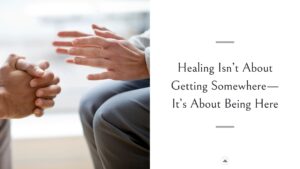
Before, After, and Now: Healing After Life-Altering Events
Healing isn’t about returning to who you were—it’s about learning to live fully in the present and trusting the unfolding of your journey after life-altering events.

Yes, your past matters.
Yes, trauma shapes how you respond.
Yes, your nervous system holds patterns you didn’t consciously choose.
But let’s be really clear:
If you’re in a relationship that’s controlling, confusing, invalidating, or consistently makes you feel like garbage—it’s not just your trauma reacting.
It’s also the fact that this. situation. sucks.
Sometimes it’s not your attachment wound.
It’s that the other person responds to your hurt with defensiveness, confusion, or silence—until you’re the one apologizing.
Sometimes it’s not your fear of abandonment.
It’s that they actually disappear when things get hard.
Sometimes it’s not your unhealed inner child.
It’s that you’re carrying the emotional weight of two grown-ass adults and calling it love.
It’s tricky. Trauma and present-day dysfunction often dance together like they’re in a codependent tango.
But here are a few ways to tell if it’s your past, your present, or both:
If yes—ding ding! It’s not just you.
You don’t need a perfect nervous system to notice mistreatment.
If you’ve meditated, journaled, self-reflected, EMDR’d, and apologized for how you “showed up,” but you still feel like you’re walking on eggshells… it might not be your past. It might be your present yelling at you.
Insight is not intimacy. You can understand someone’s trauma patterns all day long—but if they’re not interested in doing the work too, you’re in a one-way emotional labor camp.
That might be your cue. Not to go deeper into your wounds—but to stop spiritualizing red flags.
You don’t have to become a fully actualized being before you get to say:
“This doesn’t work for me.”
“I don’t feel good here.”
“I deserve more.”
Your trauma might make the pain louder.
But that doesn’t mean the situation isn’t harmful on its own.
You can hold both:
Yes, I’ve been hurt before.
And also, this current thing is not okay.
You are not here to learn every lesson the hard way.
You’re allowed to say “no more” even if your therapist hasn’t signed off yet.
Trust your body.
Trust your clarity.
Trust the part of you that doesn’t need an origin story to justify walking away.
“Sometimes it’s not your abandonment wound. Sometimes it’s just someone being an a**hole.”
Embracing Shadows, Illuminating Hope,
Chelsey Fjeldheim, LCSW
Empowering Souls on the Path of Healing
Copyright © 2025 Chelsey Fjeldheim, Courage Speaks Counseling

Healing isn’t about returning to who you were—it’s about learning to live fully in the present and trusting the unfolding of your journey after life-altering events.

Healing isn’t about fixing yourself. It’s about staying present, feeling fully, and letting transformation happen without force.

There’s no perfect time to start therapy, but if you feel stuck, disconnected, or overwhelmed by change, it might be the right time to explore it.

Because you matter. You are important. You are worth it.